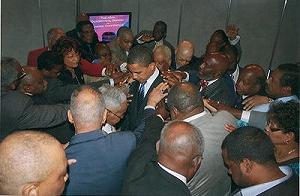Black Heritage 2009
 | | Too bad not all superficial divisions are this much fun |
Every year during Black History Month, in the interest of being open about "race relations" in America, I devote an essay to the subject of skin color. Last year, I made my case against Black History Month. This year, while my core belief that the color of a person's skin is no more relevant than his or her height, eye color, or bellybutton shape, I must confess that I have a slightly greater appreciation as to how our society has gotten so wrapped up on the subject. I still do not believe that black people have a different history than white people--anymore than brunettes have a different history than blondes--but I think I can understand the existence of Black History Month, though I still do not fully endorse it.
When Obama won the election, I watched the whole thing play out on television. I watched as hundreds upon hundreds of black people embraced each other and shed tears of joy and wonderment. I watched as each news channel gave the microphone to the newscaster with the darkest skin and let him pontificate about what a "historical" and amazing event was taking place. I, indeed, watched history being made, and the importance of it was not lost on me.
Now, I didn't vote for Obama--and I've explained why--and I'm not sure yet how I feel about how he's running the country, but there was something moving about watching him become president. At the risk of overgeneralization, black people in this country have a lot of sociological baggage to deal with. For most of America's history, people with black skin were treated as less than human, undeserving of those inalienable rights the white people were so quick to guarantee each other. Even after slavery came to an end, black people were still regarded as second-class citizens, and it wasn't until the last half of the last century that we passed laws declaring that skin color is of no relevance in regards to the law.
 | | Barack Obama: Black Jesus? |
Granted, I think there are still legal problems to address. Things like affirmative action, racial quotas, racial profiling, and other race-based legislation are still running rampant, perpetuating wide-scale discrimination in the courts, colleges, and workplace. In terms of "racial" harmony and equality, the United States of America is lagging far behind much of the rest of the world.
But America has certainly gone far in a short period of time. The fact that we are open enough to elect a black president less than fifty years after the Civil Rights Act proves this. However, the fact that we are treating it like such a big deal proves that we are pretty far from being a truly color-blind and enlightened society. People still have to look at him to reassure themselves that blacks can be just as successful as whites, and we pat each other on the back with a smile because we are so great that we can elect a black man as president. We're still a far way off from looking at him and just calling him a man instead of referring to him as a black man.
Let's face it: no matter what else Obama does during his presidency, he will always be remembered as the first black president of this country. Can you name the first red-haired president? (In case you're wondering, it's Thomas Jefferson.)
 | An incomplete list of nationally recognized observances for October:
Italian-American Heritage Month
Filipino American History Month
Diversity Awareness Month
Vegetarian Awareness Month
Polish American Heritage Month
National Down Syndrome Awareness Month
and, of course, National Toilet Tank Repair Month |
The fact that we are so hung up on skin color is proof that we still have work to do. That is why Black History Month still exists, whereas things like Blue-Eyed History Month does not. While many black people have been able to overcome the unique socio-economic predispositions of their "race," there are many others who need to be reminded that the color of their skin is no excuse for failure. If we can highlight the greatest black people in our united history, young black people living in the worst of conditions can be taught that being black won't stop them from being great. This is true of all "races" and ethnicities, but it comes with a price.
And that price is divisiveness. Saving all the black people for a single month in the classroom reinforces to children that black people are inherently different than white people. Even referring to it as "racial" exacerbates the problem, because we are teaching children that white people and black people aren't even members of the same race! Of course we are, dangit; we are all human beings, but for some reason, whenever we talk about the differences between white people and black people, the subject is somehow about "race" rather than just skin color. We cannot truly overcome discrimination until we stop teaching our children to pay attention to the superficial differences that make each of us unique. And if it's a systemic problem with elementary and secondary education, it's a much worse epidemic in higher education.
All I can really remember from my liberal arts classes at the University of Florida is the post-modernist mantra of "race, class, gender." Students nowadays aren't allowed to study a work of literature without examining it from a socio-economic, racial, sexual, or leftist political point of view. Not catering to this all-but-the-white-male perspective will result in failure in your liberal arts classes; the only way I made it out with a degree was by pretending to feel and think in ways that I simply do not. If you don't believe me, sign up for classes and see for yourself.
 | | Race, Class, Gender: why we can't be equal until we highlight and recognize all of our superficial differences |
The reason this is a problem is that, at the highest levels of academia, we are being told to appreciate someone, not for what they say or do, but for what color their skin is, what sexual organs they have (and whom they choose to share them with), and how much money they have. People are being programmed at a young age to see people for all of their superficial differences and judge them for it. This is the opposite of Martin Luther King, Jr.'s dream, and it offends me to the core.
One argument I often hear when I bring this up is that, if we lived in a perfect world, my arguments against Black History Month would have more merit. Sounds like a pathetic excuse to me; let's make this a perfect world instead of settling for something we know is inherently flawed.
So, while I can appreciate that people with black skin in this country need some reinforcement due to how they've been treated in the past, I cannot fully embrace the existence of Black History Month. Yes, we should teach about the contributions of people of all creeds, colors, and hues, and we should be doing it year-round. Saving it for a single month so that we can alleviate white guilt only makes the "racial" divide in this country wider and wider.
-e. magill, 02/23/2009
|
|